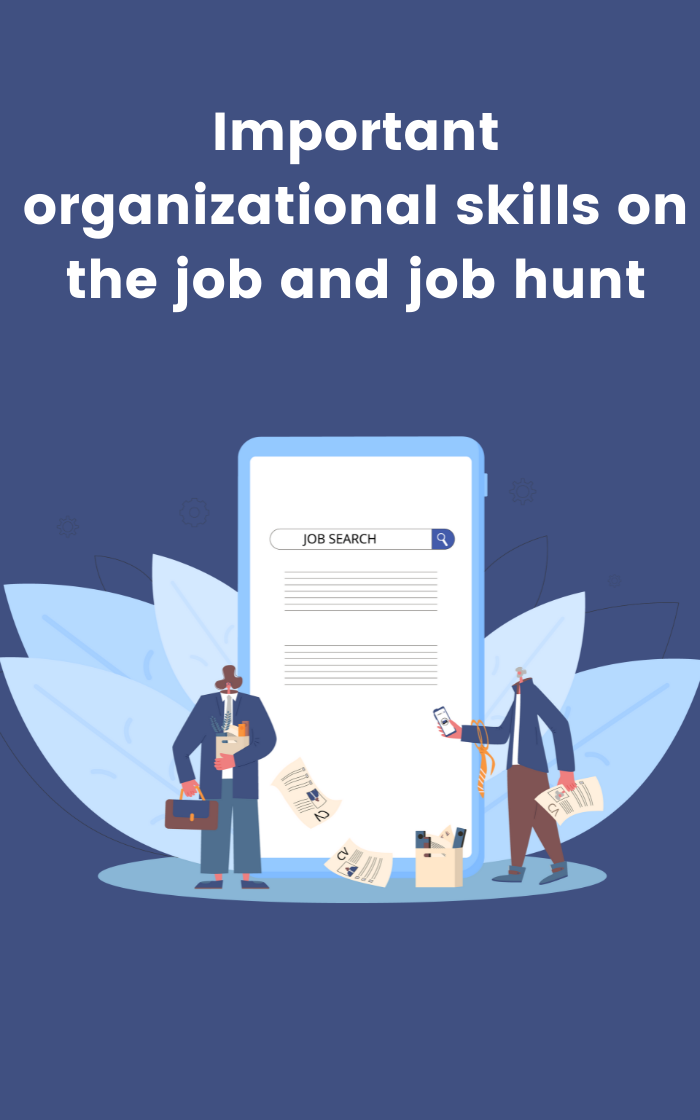Important organizational skills on the job and job hunt

Parent Post
Digital organizationWhen you’re not
Digital organization
When you’re not spending valuable time tracking down important files or emails, you can use your time efficiently and boost your productivity.
Organizing digitally can encompass both your individual computer usage and shared digital resources.
To improve your digital organization, decide what things will be saved where and how.
Organizational skills can not
Organizational skills can not only help you manage your current job but they can also help you look for a new job or land a promotion.
And thankfully, you can improve your organizational skills and show them off in your job hunt.
During your interviewThe key
During your interview
The key is to not just tell your interviewer that you have great organizational skills but rather to show it and prove it by sharing specific stories that highlight those skills.
Don’t wait for an employer to ask you about your organizational skills explicitly (they likely won’t). Use every question as an opportunity to show them off with specific examples.
Create a master Google
Create a master Google Sheet that’s clearly labeled in a shared folder where your team will add in certain details about clients.
Set aside a few minutes at the end of each week to back up important files and label and organize them properly.
Check in with your digital organization system regularly to ensure it’s functioning at its full potential.
To step up your
To step up your planning skills, begin by reverse engineering whatever you’re trying to plan.
If you’re mapping out a big new project, get clear on the end goal then brainstorm all possible steps that will be needed to accomplish it. If others are involved in the project, make decisions around who will do what and how they should accomplish each task.
Most importantly, lean into your intuition.
Time managementWhile planning is
Time management
While planning is about mapping out tasks, time management skills are more about scheduling your time day-to-day, which ultimately impacts how effectively you can stick to the plans you’ve created.
Having proper time management allows you to prioritize projects that will deliver the most impact.
What are organizational skills?Organizational
What are organizational skills?
Organizational skills can aid you in arranging your digital and physical spaces as well as managing, prioritizing, and planning everything you need to do. They help optimize results in the workplace and enable you to be the best you can be at your job.
So here are 5 essential organizational skills for the workplace.
To optimize your physical
To optimize your physical organization, create sensible strategies and physical solutions for facilitating workflow, cleanliness, and efficiency in a workspace.
Begin by decluttering. Ask yourself what items you really need and what is just taking up precious space. Then, designate a “home” for everything so you know exactly where to find it, saving time and frustration in the future.
Schedule 5to 10 minutes of tidying time in your calendar at the end of each day to straighten up.
The two key things
The two key things to home in on are prioritizing and scheduling.
Start by writing out a to-do list. Next, prioritize the tasks on the to-do list based on deadlines and expectations.
Create a schedule for the day outlining when you will work on each item, starting from high-priority to low-priority items.
Pro tip: Use a time tracker app or similar to better predict how long a task will take you when you’re scheduling your days.
CommunicationMany problems result from
Communication
Many problems result from miscommunication.
Strong communication skills ensure that everything stays organized. They help others understand and follow your plans and organization systems, and help you figure out what’s expected of you for anything you’re trying to organize at work.
It isn’t just about verbal expression but also nonverbal communication such as posture, eye contact, and body language, as well as your listening ability.
PlanningPlanning requires thinking both
Planning
Planning requires thinking both long and short term to organize tasks and assignments in a way that facilitates productivity and performance.
You can use planning skills at work to map out big projects, break them down into smaller tasks, and then decide when each task should be completed.
Planning is essentially creating a roadmap with clear directions and instructions for everyone involved to achieve the desired outcome in the most efficient way possible.
When you’re trying to
When you’re trying to communicate something, take time to think about what you want to say first and be as direct as possible.
Clear and direct communication will save you and your colleagues time going back and forth trying to understand one another and, in turn, help streamline your workflow.
How to show off
How to show off your organizational skills in a job hunt
On your resume
Include organizational skills on your resume and LinkedIn profile.
How you showcase these skills on your resume is important. Instead of just listing them in the skills section, incorporate them into your work experience and give them context using strong bullet points.
Physical organizationMaintaining an organized
Physical organization
Maintaining an organized physical workspace can improve your mindset and productivity by eliminating the stress and wasted time spent looking for the things you need.
An organized space also cultivates a more serene ambience.

